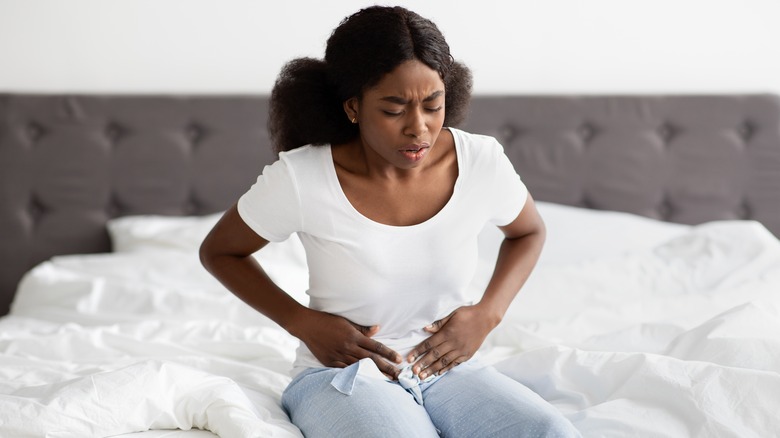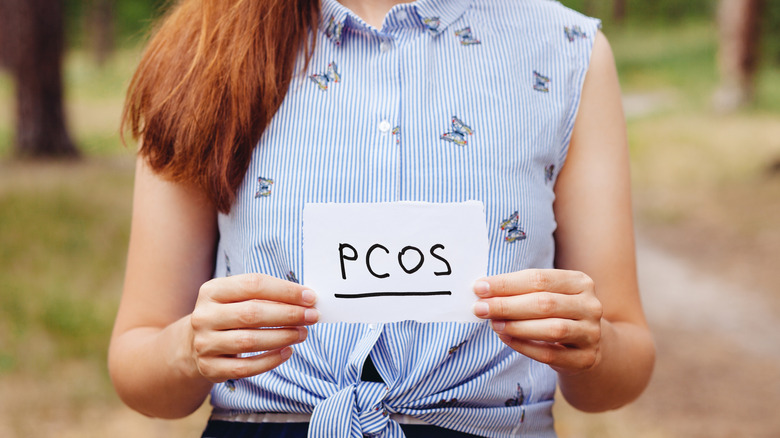Possible Reasons Your Period Came Early - And When To Be Concerned
For people who menstruate, the month is often determined by the dates their period occurs. And while periods typically occur monthly, the menstrual cycle looks different for everyone.
According to Mayo Clinic, an average period can last two to seven days and occur on day 21 to day 35 of the menstrual cycle. This leads to a lot of variety, which can cause concern among those who are used to having their period on the same day each and every month. Plus, your period can give a lot of insight into health and wellness, so when it isn't consistent, it's easy to wonder if it means something more.
And while many people are concerned with a late period, which could be due to pregnancy, stress, weight changes, or birth control, per Parents, there are also some who see a red flag when their menstrual cycle starts earlier than expected. Overall, notes Healthline, an early period now and then is completely normal, but it's important to identify the cause and know when you should be concerned and seek help from your doctor.
Your stage in life impacts your cycle
Whether you are just starting your period and hitting puberty or nearing the end of your menstrual cycles and entering perimenopause, you may find that your period comes earlier than expected, via Healthline. In fact, after a period first starts, it can take a few years to become truly regular, meaning an early period during this time is completely normal and not a cause for concern.
For people entering the end of their reproductive years, typically between the ages of 47 and 51, earlier periods are also common. According to Medical News Today, as you near menopause, the estrogen levels in your body begin to slowly decrease, causing periods to come early and be lighter and last fewer days.
While both of these life changes are normal and usually not a cause for concern, you should contact your doctor if puberty is starting before the age of 8 or after the age of 13 or if you are entering perimenopause and having super heavy bleeding, pain during sex, or any new symptoms.
An increase in intense exercise might make your period come early
According to Healthline, your body needs a good amount of energy in order to menstruate as producing hormones is hard work. If you start a new workout regime and are suddenly using all of that energy, your period may be affected. Don't worry too much, though. If you have decided to start a new home workout or go for a daily run, you shouldn't notice any changes. This is mostly going to affect those who partake in strenuous exercise or activities that require weight limits. As a rule of thumb, if you are burning more calories than they consume, your period may sneak up on you early.
According to Verywell Health, intense exercise may also lead to spotting, which can be misconstrued for your period. Overall, this isn't a cause for concern and in fact, exercise done correctly can actually help people who suffer from period pain. But if exercise hurts while on your period, be sure to talk to your doctor.
Fluctuations in your weight can trigger an early period
If you notice your period came early, take a look at the scale. Whether you gained weight or lost it, a change in your weight can also change your hormones, causing your period to come earlier than expected, per Insider. Although weight gain can also cause changes to your flow, most people will notice this change when they have lost a ton of weight quickly. People who suffer from eating disorders may also notice a change in their menstrual cycle.
According to Everyday Health, people who are underweight often have issues ovulating regularly. Without fat cells, the body is unable to produce estrogen, causing periods to be missed or come at odd times. Additionally, those who suffer from issues like PCOS will have issues with their cycle even with small amounts of weight gain. If you are suffering from an eating disorder, rapid weight loss or weight gain, or think you may have PCOS or another condition, consult with your doctor.
If you need help with an eating disorder or know someone who does, help is available. Visit the National Eating Disorders Association website or contact NEDA's Live Helpline at 1-800-931-2237. You can also receive 24/7 Crisis Support via text (send NEDA to 741-741).
Stress can make your period come early
Stress can wreak havoc on your entire body. According to Mayo Clinic, it can lead to everything from headaches, fatigue, and upset stomachs to behavioral issues like withdrawing socially and emotional outbursts. But added stress can also affect your period. According to Healthline, stress also affects your hormones, which leads to irregular periods. For the most part, stressing about a big meeting at work or a weekend event won't cause your period to show up unexpectedly. Moreso, those who suffer from anxiety or had a traumatic life event occur will notice the change. This type of stress is often accompanied by changes in your weight (which can add to your changing cycle), difficulty sleeping, and a hard time staying focused.
No matter what level of stress you are feeling, it is always good to talk with a doctor. But, if you are noticing your period coming early, or late, or even not all, it's vital to consult with them and figure out your options for dealing with the stress.
Certain medications can affect your cycle
If you were not expecting your period this early, it can often be blamed on new medications. According to Healthline, if you started a blood thinning medication or even a new hormonal birth control, you are likely to see changes in your cycle. Even IUDs or the Depo-Provera shot can cause your period to show up untimely for a few months.
But it's not just major medications and hormone-focused medications like birth control that can cause changes to your cycle. According to Alberta Health, aspirin (which is also a blood thinner) can affect your flow, as well as thyroid medications, chemotherapy, Advil, Motrin, and Aleve. If you notice a change in your period after using any of these medications, be sure to run it by your doctor.
Although an early period is often a normal side effect of medication and not a cause for concern, prolonged disruptions in your cycle can be, so contact your doctor to let them know what you are taking and how it's affecting your period.
Concerning causes of an early period
While all of the above reasons can be a cause for concern, there are a few serious medical conditions that are diagnosed when a period is irregular and consistently showing up early. According to Medical News Today, sexually transmitted infections or STIs are one of those conditions. Often, if you do have an STI, the bleeding you experience will actually not be your period, but in fact spotting or vaginal bleeding as a symptom of the STI. STIs often also come with other symptoms like discharge, pain during sex, and pain during urination.
Those who have recently experienced pregnancy loss before 20 weeks may also notice bleeding before their expected period. According to Healthline, conditions like thyroid disease, undiagnosed diabetes, endometriosis, and PCOS can also cause an early period. All of these conditions should be taken seriously and you should speak with your doctor as soon as possible.
An early period may not always be a sign of an issue, but it could be the first symptom of something much larger, so speaking with a healthcare provider will not only give you peace of mind, but ensure your body is healthy and menstruating as it should.






